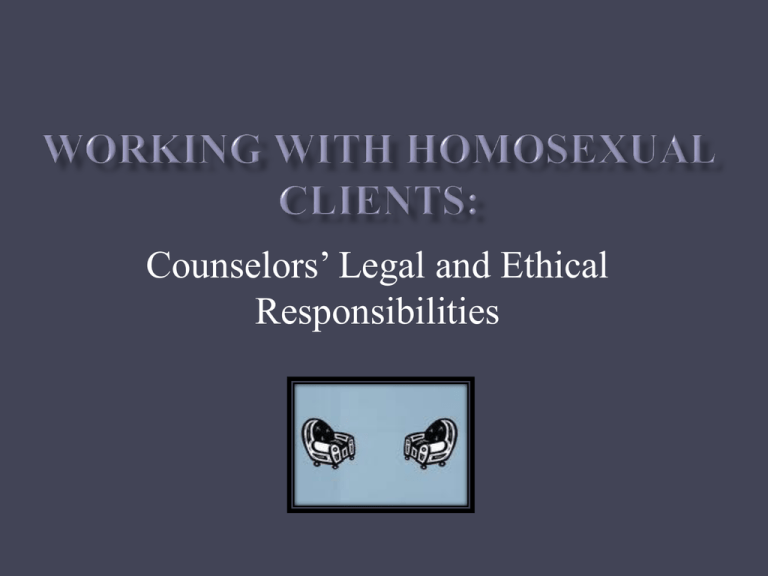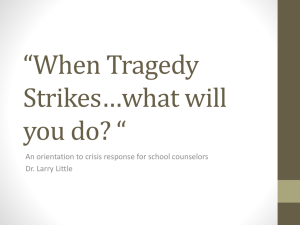
Counselors’ Legal and Ethical
Responsibilities
Ethical and Legal
Standards of Care in
Counseling: What
Should Mark Do?
Mark Hopkins is a Licensed
Clinical Professional Counselor
who works with a private
Christian counseling center.
Mark’s particular religious
philosophy and belief is that
homosexuality should not be
encouraged. A new client, Peter
Hall, has come to his first
counseling session with the
stated intention of improving his
relationship with his partner,
Rick Johnson.
Define the Problem/Dilemma
Identify Relevant Variables
Ascertain Law, Ethics Codes and Policy
Consider Personal Influences
Obtain Outside Perspective
Weigh Options and Consequences
Decide and Take Action
Document Decision-Making and Follow-up
Dana Add Citation here: Wheeler and others
Mark Hopkins' values pose an ethical dilemma
for counseling his client, Peter Hall, about his
homosexual relationship with his partner. The
core problem is the clinician's values are in
conflict with the client's values, and this problem
has legal, ethical, clinical, professional, and
moral dimensions
If Mark imposes his own values on his client,
either actively or passively, he will not be able to
meet the standards of care mandated by the law
and the counseling profession.
It is unknown the extent to which Mark is aware
of his values and how these values affect his
clinical work. There is a risk that Mark could
impose his values, either actively or passively,
and in so doing, harm to his client. It is possible,
however for counselors like Mark to engage in
clinical practice with “nonjudgmental and
accepting attitudes, regardless of [their] own
value system.”
(Fix this citation, including original source. Corey et al, p.
139).
Maryland law stipulates that “A counselor may
not:
(a) Place or participate in placing clients in positions
that may result in damaging the interests and the
welfare of clients…
(b) Condone or engage in discrimination based on
…sexual orientation…”.
(COMAR, 10.58.03.05.05)
"Ethics represents aspirational goals, or the
maximum or ideal standards set by the profession,
and they are enforced by professional associations,
national certification boards, and government boards
that regulate professions"
(Incorrect citation style Corey et al, p. 14)
There are two central points in the ACA Code of Ethics that
apply to Mark’s dilemma:
Avoiding Harm
“Counselors act to avoid harming their clients … and to
minimize or to remedy unavoidable or unanticipated harm.”
(ACA Code, A.4.a)
Personal Values
“Counselors are aware of their own values, attitudes, beliefs,
and behaviors and avoid imposing values that are inconsistent
with counseling goals. Counselors respect the diversity of
clients….” (ACA Code, A.4.b.)
Mark Hopkins is employed by a private Christian
counseling center.
Hermann and Herlihy (2006) suggest that
counselors “might choose to work in settings that
are compatible with their values” (Corey et al, p.
140). It is not known if Mark’s religious philosophy
and belief is “compatible with” the values of this
counseling center.
(1) Advertising
Counselors should “advertise [their] values to potential
consumers of counseling services” (Corey et al, p. 140).
(2) Informed Consent
Further, Hermann and Herlihy (2006) state that
counselors “have an ethical duty to avoid harm to
clients by ensuring that counselors’ informed consent
procedures provide potential clients with adequate
information about counselors’ values” (Corey et al, p.
140).
"Morality is concerned with perspectives of right
and proper conduct and involves an evaluation of
actions on the basis of some broader ... religious
standard"
(Corey et al page 14)
Mark’s particular religious philosophy and
belief is that homosexuality should not be
encouraged.
(MORE HERE??????)
The people involved in this dilemma include the counselor,
Mark Hopkins, LCPC; his gay client, Peter Hall and,
indirectly, Peter’s partner, Rick Johnson. Ramifications of
good or bad decisions and outcomes will also have an effect
on the broader community.
Treatment Goals:
Peter's goal is to improve his relationship with his partner,
Rick Johnson. Further treatment goals—either Mark’s or
Peter’s—have not been specified.
Client Background/History/Dynamics:
It is possible that Peter is Christian, as he has chosen to
seek counseling at a private Christian counseling center.
At this point, Peter’s social/psychological history is not
known, including key information about his level of
self-acceptance, his experiences as a gay man in a gayunfriendly culture, etc.
Mark's religious philosophy and belief is that
homosexuality should not be encouraged, a fact which
sets up a potentially harmful dynamic between the client
and the counselor.
Multicultural Considerations:
Peter may be Christian. It is possible Peter's religious
philosophy and belief supports, or is neutral with respect to
his sexual orientation. Given these value differences between
Mark and Peter, it may be difficult for them to develop a
trusting relationship. Further, it may be difficult for Mark to
hold his religious views in tension with his mandate as a
counselor to "avoid discriminating against ... anyone on the
basis of ... sexual orientation." (AAPC Code, I.B.) Mark may
need to examine his ability to offer counseling to Peter or
any gay person.
"Working with lesbian, gay, and bisexual individuals presents a
challenge to counselors who hold strong personal values
regarding sexual orientation. Mental health professionals who
have negative reactions to homosexuality are likely to impose
their own values and attitudes, or at least to convey strong
disapproval."
(Multicultural Perspectives and Diversity Issues, p. 133)
"Any therapist who may work with lesbian, gay or bisexual
people has a responsibility to understand the special concerns of
these individuals and is ethically obligated to develop the
knowledge and skills to competently deliver services to them."
(Multicultural Perspectives and Diversity Issues, p. 133)
The Case of Mark Hopkins bears strong
resemblance to a 2001 case heard by the US
Court of Appeals for the Fifth Circuit, Bruff v.
North Mississippi Health Services, Inc. In this
case, a counselor employed by North
Mississippi Health Services refused to
counsel a lesbian client on relationship issues
because homosexuality was in conflict with
her personal religious beliefs. After attempts
were made to accommodate the counselor,
she was eventually terminated. She
subsequently sued her employer on the basis
that her right not to act against her religious
principles was protected by federal law. The
court disagreed, and dismissed the case.
Hermann and Herlihy, 2006
“…An employer’s legal obligation to make
reasonable accommodations for employees’ religious
beliefs does not include accommodating a counselor’s
request to refer homosexual clients who ask for assistance
with relationship issues.” Hermann and Herlihy, 2006
The court found that refusing to counsel homosexual
clients on specific issues constitutes discrimination.
Hermann and Herlihy, 2006
Selectively refusing to work with a gay client on specific
issues may cause emotional harm to the client.
Hermann and Herlihy, 2006
The Equal Protection Clause of the 14th Amendment
specifically prohibits discrimination based on sexual
orientation. (Supreme Court Romer v. Evans decision, 1996).
Hermann and Herlihy, 2006
“Counselors cannot use their religious beliefs to justify
discrimination based on sexual orientation. In addition, an
employer can terminate the employment of a counselor who
refuses to counsel clients on issues related to the client’s
sexual orientation.”
Hermann and Herlihy, 2006. p. 416
Federal Law prohibits discrimination on the basis of
sexual orientation.
The Supreme Court interprets selectively counseling
homosexual clients as discrimination.
Maryland law prohibits discrimination based on sexual
orientation.
“From a legal perspective…refusing to counsel homosexual clients on
relationship matters can result in the loss of a therapist’s job.”
(Corey et al, 2007, p. 139).
Refusal to counsel a
homosexual client is
also grounds for
malpractice
“To prevail in a malpractice suit, a client
must show that there was a duty owed to
the client, that the counselor breached
that duty, and that the client was injured
(physically or emotionally) because the
counselor breached his or her duty.”
(Hermann and Herlihy, 2006 p. 416)
Refusing to treat a homosexual client—
or to selectively avoid counseling on
certain issues—could result in a
situation meeting the threshold of
malpractice with gay clients.
Mr. Hopkins may be tempted to refuse to work with
this client based only on his conflict with Peter
Hall’s homosexuality. However, this “solution” to
potential problems does not present a legal or ethical
alternative to working with this client.
Mr. Hopkins also cannot legally or ethically
“selectively counsel” his client by refusing to
discuss homosexual relationship issues.
According to the ACA Code of Ethics:
“Counselors practice only within the boundaries of their
competence, based on their education, training, supervised
experience, state and national professional credentials, and
appropriate professional experience. Counselors gain
knowledge, personal awareness, sensitivity, and skills pertinent
to working with a diverse client population.” ACA Code C.2.a.
If Mark Hopkins is not currently competent to counsel Peter
Hall because of a lack of training, education, or experience, he
could ethically refer him to another counselor.
Note: This analysis relies on the arguments of Hermann and Herlihy, 2006
“If counselors determine an inability to be of professional
assistance to clients, they avoid entering or continuing
counseling relationships. Counselors are knowledgeable about
culturally and clinically appropriate referral resources and
suggest these alternatives. If clients decline the suggested
referrals counselors should discontinue the relationship.”
ACA Code A.11.b.
It is suggested by court precedent that “an inability to be of
professional assistance” is not the same as “values which
conflict with the clients’.”
Note: This analysis relies on the arguments of Hermann and Herlihy, 2006
Mark's personal bias, "that
homosexuality should not be
encouraged," may affect his
relationship with his client
It is possible that Peter would
perceive Mark’s views, which
could cause harm.
Duran, Firehammer, and
Gonzales (2008, p. 288) in
Corey et al "assert
that culture [i.e. including
sexual orientation] is part of
the soul: 'When the soul or
culture of some persons are
oppressed, we are all
oppressed and wounded in
ways that require healing if
we are to become liberated
from such oppression."
(Multicultural Perspectives and
Diversity Issues, p. 114-115)
Correct this citation
Obtaining outside consultation
and/or supervision is especially
important for Mark Hopkins, who
faces complex issues in his
decisions about how to handle
counseling a gay client, given his
personal values.
Consulting experts demonstrates a
counselor's desire to provide the
best possible care for clients
(Corey, 2007), and is strongly
supported by several aspects of the
ACA ethics code.
Obtaining an
Outside
Perspective
"Counselors take reasonable steps to
consult with other counselors or
related professionals when they have
questions regarding their ethical
obligations or professional practice.“
(Section C.2.e )
"Counselors strive to resolve ethical
dilemmas with direct and open
communication among all parties
involved and seek consultations with
colleagues and supervisors when
necessary" (Section H, Introduction )
"When uncertain as to whether
a particular situation or course
of action may be in violation
of the ACA Code of Ethics,
counselors consult with other
counselors who are
knowledgeable about ethics
and the ACA Code of Ethics,
with colleagues, or with
appropriate authorities.“
(SectionH.2.d)
Mark can choose among
several possible courses
of action which are both
legal and ethical.
A)
He can choose to
counsel Peter on
improving his
relationship with his
partner, Rick.
If he chooses this
pathway, he must do
so with the intention of
upholding his legal
and ethical obligations
to the client.
Mark can choose among
several possible courses
of action which are both
legal and ethical.
B)
He can choose to refer
Peter to another
counselor who is more
competent to provide the
services requested.
If he chooses this
pathway, he must do so
with the intention of
upholding his legal and
ethical obligations to the
client. He cannot refer the
client solely because his
own values conflict with
the values of the client.






